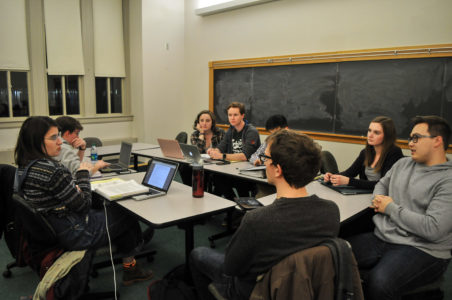
On mock trial for attempted murder last weekend were Carmen Bell-Leon and Dylan Hendricks, an extramarital couple, charged with trying to kill Carmen’s spouse Kerry Bell-Leon. While Carmen was out of the country on July 17, 2017, Hendricks snuck into the Bell-Leon house, unsuccessfully attempted to shoot Kerry in a dark apartment and then tried to strangle them with an extension cord.
The Grinnell Mock Trial team attended a tournament this past week at Loras College. While the team did not place well enough to receive an award, witness and captain Irene Gilbert ’18 won an award for her outstanding job as a witness.
Each year, Mock Trial teams get a new case to work on from the American Mock Trial Association (AMTA). At tournaments, the teams present their case “as if it was a real case in front of a real judge in a real court of law,” according to Anthony Fitzpatrick ’18, mock attorney and one of the team’s captains. A team might perform a trial up to four times in one tournament. However, it is always engaging as everyone performs differently each time. Half of the time, the team plays the prosecution, and the other half they serve as the defense. Judges consist of law students, lawyers and sometimes even real judges.
“Usually on each team, half are attorneys and so they play the role of attorney and ask the witness questions, [and] make objections based on evidentiary rules — we have our own set of evidentiary rules which are based on the federal rules of evidence, called the Midlands rules of evidence,” Fitzpatrick said. “Witnesses play particular characters in the case, so you might have someone playing the defendant so they have to act like them and answer questions in character.”
The Grinnell Mock Trial team is unique in that they lack a faculty or attorney coach. While most teams have paid coaches helping them out with the case, Grinnell’s team is student-run and enjoys coming up with case theories all on their own.
“I think it makes our cohesion as a team a little bit stronger because we have to work together,” said Sarah Millender ’20, a mock witness. “At the end of the day, we’re the ones competing, so if we’re going up there and doing something we haven’t created ourselves and thought up ourselves, it’s not as gratifying.”
Sometimes it can be challenging to lack someone with law experience to help the team with their case theories, according to Fitzpatrick. The benefits, however, outweigh the drawbacks.
“I think it makes us a lot more dynamic. I kind of feel like we take greater ownership of ourselves and our own progress which I don’t know if you would see as much on a coached team,” Fitzpatrick said. “I feel like everyone has evolved, we all know we’re in this together and it generates a lot of community and it makes us more able to bounce back and flexible than other teams.”

















































